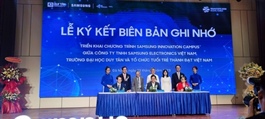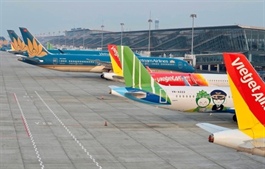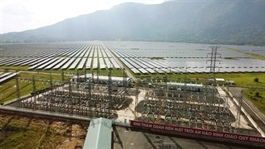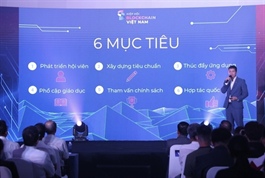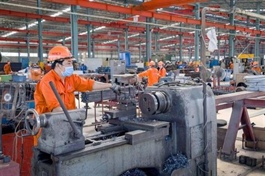Retail action hots up with store openings
Retail action hots up with store openings
Vietnam’s retail market is becoming a fertile ground for not only domestic retailers but also foreign brands seeking to do business up and down the country.

Last week, UNIQLO Vietnam announced the opening of a new store in Hanoi’s Cau Giay district. The new store will cover more than 1,000 square metres with world-class services, expected to create a comfortable shopping experience.
It brings the number of UNIQLO stores in Vietnam to 19. In just over six months, the Japanese fashion brand has launched six new stores, and another new store in Binh Duong province is also to open imminently.
Osamu Ikezoe, general director of UNIQLO Vietnam said, “Our three years of development, in terms of physical stores and an online store, has been a memorable journey. We have achieved our targets in opening retail stores in Vietnam so far. This inspires us to continuously open and even increase the speed of opening new stores to meet such strong demand.”
As of last week, another major name to now boast an online store in Vietnam is Apple. The tech giant announced the roll-out of the store as part of the company’s efforts to reach more emerging markets.
Apple also provides additional retail services in Vietnam which include Apple Trade In, safe data transfers, student discounts, and AppleCare+.
The company is offering up to 24 months of financing with home-grown fintech group MoMo. According to a separate statement from MoMo, customers can split their purchases into monthly instalments with a 20 per cent down payment.
Apple’s recent focus on emerging markets has been paying dividends. In the company’s most recent earnings call, CEO Tim Cook reported record-breaking sales in countries like Indonesia, Malaysia, Brazil, and the Philippines.
“With that, we’re putting efforts in a number of these markets and really see, particularly given our low share and the dynamics of the demographics, a great opportunity for us in those markets,” Cook said.
Meanwhile, Central Retail, Thailand’s largest retailer, late last year announced its biggest investment in Vietnam of up to $1.45 billion to cover 2023-2027. The group aims to double the number of its stores in Vietnam to over 600 and increase its presence to 57 localities across the country.
Olivier Langlet, CEO of Central Retail Vietnam said, “Vietnam is the market, besides Thailand, that brings the largest revenue for the group, about 21-22 per cent of total revenue. Last year, the number even reached 25 per cent.”
Other companies are also looking to get in on the action. It was revealed that accessories brand Tory Burch and perfume retailer Diptyque have partnered with local distributor Tam Son International to launch their first physical stores in Vietnam.
Located in District 1’s Union Square, Tory Burch offers bag collections along with other accessories ranges. The brand, founded in 2004, currently has more than 100 locations around the world.
Meanwhile, perfume brand Diptyque’s first physical store opened last month in Ho Chi Minh City’s Diamond Plaza.
Diptyque opened its largest store in Seoul last year, demonstrating faith in the rapidly growing South Korean perfume market.
In general, Vietnam has been named among the top five most dynamic retail markets in Asia and ranked 28th among the world’s most attractive retail markets.
According to the Ministry of Industry and Trade, the Vietnamese retail market is worth $142 billion and is expected to increase to $350 billion by 2025, contributing to 59 per cent of the country’s GDP.
Vietnam is considered to have a high-growth rate and draws investment from many foreign corporations and businesses. According to the General Statistics Office, Vietnam’s total retail sales of goods and services in the first four months of 2023 were estimated at $4.9 million, up 13.8 per cent over the same period last year.
Along with the rise of domestic enterprises, Vietnam’s retail market is increasingly prosperous. However, the competition between domestic and foreign retailers is also getting stronger.
According to Le Huy Khoi at the Vietnam Institute of Industrial and Trade Policy and Strategy under the Ministry of Industry and Trade, retail sales of foreign-invested enterprises currently account for only about 4 per cent in total, a modest proportion compared to the 10 per cent of state-owned enterprises and 86 per cent of non-state enterprises.
“Although foreign-invested enterprises only own about 90 retail points out of a total of 800 supermarkets in Vietnam, the sales volume at a foreign supermarket and shopping mall is on average three to four times higher a local supermarket thanks to the larger scale,” Khoi said.
He added that fast-growing foreign-led enterprises, thanks to their strong financial potential, well-known brands, and methodical business strategies, were gradually taking over Vietnam’s retail market share and acquiring Vietnamese businesses and brands through mergers and acquisitions.
“If domestic retailers do not make efforts to improve their competitiveness, they will be left behind and pushed out of the market,” Khoi added.



